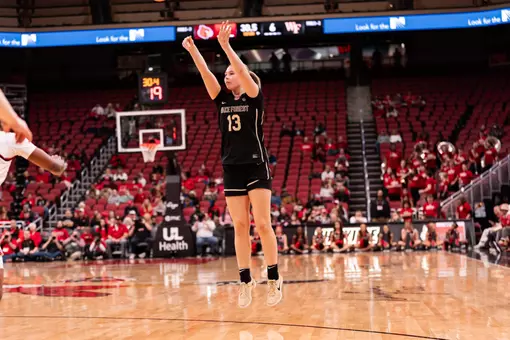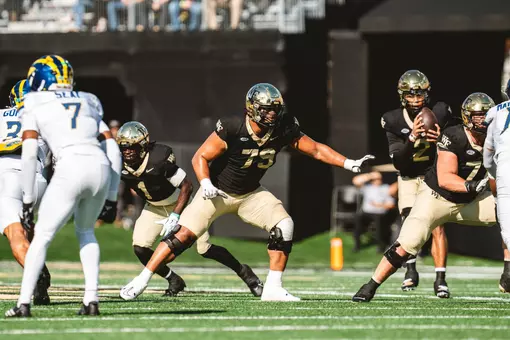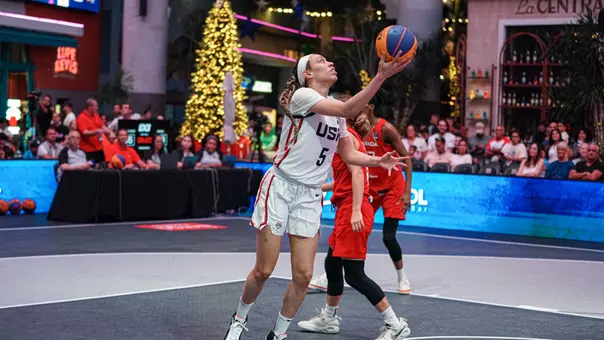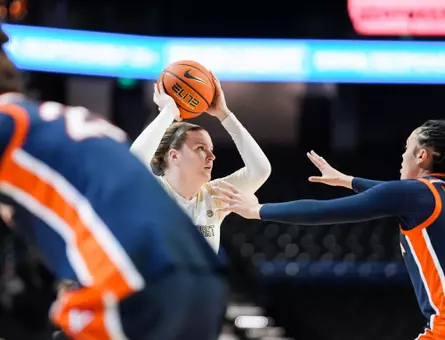Wake Forest Athletics

Caldwell, Curtis Honored as Wake Forest’s ACC UNITE Award Recipients
10/20/2022 10:00:00 AM | Football, General, Women's Basketball
WINSTON-SALEM, N.C. -- The Atlantic Coast Conference has announced the winners of the second-annual ACC UNITE Award, which was created to honor individuals affiliated with the league who have made an impact in the areas of racial and social justice. Jim Caldwell (football) and Charlene Curtis (women's basketball) are the Demon Deacons' two honorees this year, as they are the first male and female black head coaches in ACC history in their respective sports.
The UNITE Award is an initiative of the ACC's Committee for Racial and Social Justice (CORE - Champions of Racial Equity) and was developed and approved by its 15 member institutions. C.O.R.E was created in June 2020 to support the ACC's commitment to social justice and racial equity. Members of C.O.R.E. include conference office staff members and campus representatives from each of the league's 15 institutions. C.O.R.E.'s mission is to promote and encourage inclusion, racial equity and social justice through education, partnerships, engagement and advocacy.
The UNITE Award is presented annually to individuals who:
Wake Forest Director of Athletics John Currie:
"As a charter member of the ACC, Wake Forest University is proud to participate in this effort to annually honor the incredible trailblazers at each institution. Jim Caldwell and Charlene Curtis were true pioneers in the Atlantic Coast Conference. Their kindness and class resonated throughout the student-athletes and staff they led. They were transformational leaders, displaying their abilities, talents, character and fortitude to serve as role models for the young men and women they mentored at Wake Forest and their other professional stops along their storied careers."
Jim Caldwell, Football
In his hometown of Beloit, Wisconsin, Caldwell enjoyed an outstanding high school career earning nine varsity letters as a three-sport at Beloit Memorial High. As a senior, he was part of a state championship basketball team, an undefeated football season and his 4x400 track squad that finished second in the state. He went on to attend the University of Iowa on a football scholarship, gained a first-string spot in the defensive backfield as a freshman and eventually held that starting position all four years. He graduated in 1977 with a Bachelor's Degree. The experiences he enjoyed as a player for the Hawkeyes under coach Bob Commings, though, led him into coaching.
After serving one year (1977) as a graduate assistant at his alma mater, Caldwell accepted his first full-time position under future NCAA I-AA national champion coach Rey Dempsey at Southern Illinois, where he spent three years (1978-80). He then worked one season under Dennis Green (former NFL Head Coach) at Northwestern before moving to Colorado for three years (1982-84) under Bill McCartney, who was structuring a national championship program there. Caldwell went on to spend one season (1985) at the University of Louisville where he coached under a former national championship coach, Howard Schnellenberger.
From 1986-92, Caldwell was an assistant at Penn State where he coached the wide receivers during the team's NCAA Championship season in 1986; quarterbacks and wide receivers from 1987-90 and passing coordinator in 1991-92.
Following his time at Penn State, Caldwell was named the first African American Head Coach in the Atlantic Coast Conference at Wake Forest University where the Demon Deacons' offense ranked in the NCAA's Top-25 four times. In 1999, he led the team to its first winning season and bowl appearance (Aloha Bowl) since 1992. In 1995, the Wake Forest offense was ranked 10th in the nation and quarterback Rusty LaRue established seven NCAA passing records.
Caldwell's NFL coaching roots date back to 2001 when he worked as a quarterbacks coach with the Tampa Bay Buccaneers. After acquiring quarterback Brad Johnson via free agency, Caldwell helped the veteran quarterback break then-team records for passing yards (3,046), completions (340) and attempts (540) as the team finished 9-7 and earned an NFC Wild Card berth.
In 2009, Caldwell was named the Colts' Head Coach, a position he held for the next three seasons. In his first two seasons, he directed the Colts to 14-2 and 10-6 regular-season records, winning consecutive AFC South titles, an AFC Championship and earning a berth in Super Bowl XLIV. He is one of just four Head Coaches in NFL history to win 24-plus games and earn a berth in the Super Bowl in the coach's first two seasons as a Head Coach.
During his first season as the Colts Head Coach, the team was 14-2. He became the NFL's only rookie Head Coach to win his first 14 games in a season and second to win 14 games in his rookie season as coach. He also became the fifth rookie Head Coach to reach the Super Bowl.
During his tenure with the Colts, Caldwell worked closely with All-Pro quarterback Peyton Manning and the team's quarterbacks. His leadership helped guide the Colts offense to eight Top-10 rankings in total offense during his 10 seasons with Indianapolis, and the team was a Top-5 offense six different times.
In 10 seasons in Indianapolis (2002-11), including three as the franchise's Head Coach (2009-11), Caldwell and the Colts achieved almost unparalleled success. In each of the first nine seasons, the Colts had a record-setting nine-consecutive playoff appearances that included six AFC South titles, two Super Bowl berths (XLI and XLIV) and one Super Bowl championship (XLI).
In 2014 Caldwell was named Head Coach of the Detroit Lions, in his first season with the Lions in 2014, Detroit compiled an 11-5 regular season record. Caldwell tied Potsy Clark (1931, Portsmouth Spartans) for the most wins in franchise history by a coach in his first year with the club. He is the third coach in team history to lead the Lions to the playoffs in his first year with Detroit (George Wilson in 1957; Bobby Ross in 1997).
The Lions 2014 defense ranked second overall in the NFL in total defense (300.9 yds/g) and third in points allowed (17.6 pts/g). The team's No. 2 ranking in total defense was the highest finish for the Lions since 1970, and the 300.9 yards allowed per game were the fewest yards allowed by a Lions defense since 1993.
Defensively, the Lions put together one of the best units in team history in 2014. Detroit had the NFL's top-ranked rush defense in 2014, yielding just 69.3 yards per game, which not only set a team single-season record but it also ranks as the ninth best single-season run defense in NFL history. Caldwell became the seventh coach in franchise history (since 1930) to lead the Lions to a winning record (over an entire season) in his first year with the club, and he is one of four coaches (Potsy Clark in 1931, George Wilson in 1962 and Wayne Fontes in 1991) to lead the Lions to 11-plus wins in a season.
Following a 1-7 start to the 2015 season, Caldwell led the Lions to a 7-9 record on the shoulders of the 6-2 surge to finish off the year. Detroit became the fourth team since 1991 to start a season with one or fewer wins in the first eight games (1-7 or 0-8 record) and finish with an NFL-best 6-2 record. It marks the Lions' best second-half finish since the team finished 7-1 in 1995.
In 2016, his third season at the Lions helm, Caldwell guided Detroit to a 9-7 record and a trip to the playoffs for the second time in three seasons. By earning a playoff berth in 2016, Caldwell joined Buddy Parker (1952, 1953) and Bobby Ross (1997, 1999) as the only coaches in Lions history to lead the team to the playoffs twice in their first three seasons with the club.
The Lions trailed in the fourth quarter in eight of the team's wins in 2016. The eight fourth-quarter, come-from-behind wins set a new NFL record, surpassing the previous total of seven set by the 2009 Indianapolis Colts (also coached by Jim Caldwell), for the most wins in a season after trailing in the fourth quarter.
In 2017, Detroit completed a 3-0 road sweep in the NFC North for the first time since realignment in 2002. The Lions also registered the franchise's first unblemished divisional road record since divisional alignment first began in 1967.
Charlene Curtis, Women's Basketball
Before coming to Wake Forest in 1997, Charlene Curtis had already blazed a trail for so many before her and continued to do so for her entire life. The Wake Forest community mourned her passing (1955-2022) earlier this year and remembers her incredible legacy.
Dating back to her childhood, Curtis became the first so that many could follow in her footsteps.
Growing up in the Civil Rights era in Roanoke, Va., Curtis didn't attend a school that was truly desegregated until her junior year of high school, and spent much of her youth limited as to where she was allowed to go. Quickly, however, as the world around her changed ever so slowly, she earned opportunities.
At first, through her talent in music, where she earned her first ever "first," as the first African-American in the Roanoke Youth Symphony.
Her love of athletics also remained strong, leading her to try out for the women's basketball team as a freshman at Radford in 1972. Title IX had just passed that same year, and Radford didn't even offer scholarships for women's athletics at the time.
But Curtis' talent won out, as she made the team, starting all four years as the Highlanders' first African-American player in women's basketball. She went on to become the first 1,000-point scorer, male or female, in Radford history.
Coaching, however, was not something on Curtis' radar as a student-athlete. It was her love of music, after all, that took her to Radford University, where she majored in music and dreamed of becoming a high school band director.
Her first coaching experience came shortly after she graduated, in her first job as a teacher, and eventually a band director, in Bedford County, Va. where she not only was the first African-American coach at the school she taught at, but the first African-American teacher, period.
Curtis would open many more doors in the ensuing decades, earning a graduate degree from the University of Virginia in secondary education while coaching under legendary head coach Debbie Ryan, eventually succeeding her old coach Pat Bennett at Radford at just 29 years old in 1984.
She later became the first-ever African-American head coach for women's basketball at Temple University. There she served in her first stint with USA Basketball and USA Basketball Selection Committee. It was the first of many leadership roles that she took off the court in the profession, going on to be a part of the WBCA Executive Committee, the Black Coaches Association Board of Directors and East Regional Advisory Committee for the NCAA Division I Championships.
Curtis then went on to work with an assistant coach under her old Virginia colleague Geno Auiremma at Connecticut, helping build the foundation of the program, before Ron Wellman hired her as Wake Forest's first African-American women's basketball coach in 1997.
While she was the only African-American coach among her peers in the ACC, she was not the only African-American head coach on Reynolda Campus as Jim Caldwell led the football team at the time with the two sharing the honor of the highest ranking African-Americans on staff in the athletic department.
Her time in Winston-Salem would see her cross paths with Dave Odom and Skip Prosser, with Prosser in particular enlisting her help in his mission to change the athletics' culture at the university.
While she may have been one of few, and occasionally the only person of color in certain rooms at both Wake Forest and in the ACC, that fact was never something at the front of her mind day-to-day at Wake Forest.
She knew that for that door to remain open for African-American coaches after her, she would need to make sure her student-athletes had chances to succeed not just on the court, but beyond.
The endcap to Curtis' long career of trailblazing came in 2008, when she was hired as ACC's Supervisor of Women's Basketball officials.
During her time in the conference office, Curtis oversaw the expansion of the women's basketball officiating staff, the management of all evaluations and ratings, and numerous training and educational opportunities to promote the recruitment and development of ACC Women's Basketball Officials.
She created and developed local officiating clinics with a common curriculum, something that did not exist previously, and the clinics are now commonplace across the ACC footprint.
During her tenure, the ACC added instant replay, developed a league-specific officiating website, and expanded the officiating observer program in partnership with the Colonial Athletic Association.
Curtis is survived by her partner of 24 years, Sharolyn S. Grant, her beloved sister Millicent N. Wright (Byrl) and her aunt, Evelyn Board Charlton (late James).
Other ACC Honorees:

About the ACC
The Atlantic Coast Conference, now in its 69th year of competition and 15 members strong, has long enjoyed the reputation as one of the strongest and most competitive intercollegiate conferences in the nation. ACC members Boston College, Clemson, Duke, Florida State, Georgia Tech, Louisville, Miami, North Carolina, NC State, Notre Dame, Pitt, Syracuse, Virginia, Virginia Tech and Wake Forest continue to build upon the cornerstones on which the league was founded in 1953 with a consistent balance of academics, athletics and integrity. The ACC currently sponsors 27 NCAA sports – 14 for women and 13 for men – with member institutions located in 10 states. Women's gymnastics will become the league's 28th sponsored sport in the 2023-24 academic year. In August 2019, ESPN and the ACC partnered to launch ACC Network (ACCN), a 24/7 national network dedicated to ACC sports and league-wide original programming. For more information, visit theACC.com and follow @theACC on Twitter and on Facebook (facebook.com/theACC).
The UNITE Award is an initiative of the ACC's Committee for Racial and Social Justice (CORE - Champions of Racial Equity) and was developed and approved by its 15 member institutions. C.O.R.E was created in June 2020 to support the ACC's commitment to social justice and racial equity. Members of C.O.R.E. include conference office staff members and campus representatives from each of the league's 15 institutions. C.O.R.E.'s mission is to promote and encourage inclusion, racial equity and social justice through education, partnerships, engagement and advocacy.
The UNITE Award is presented annually to individuals who:
- Best exemplify ACC CORE's mission to promote and encourage racial equity and social justice through education, partnerships, engagement and advocacy;
- Have helped create meaningful, lasting change by improving systems, organizational structures, policies, practices and attitudes;
- Have been a pioneer and/or helped pave the way for minorities either at the institution or in the community
Wake Forest Director of Athletics John Currie:
"As a charter member of the ACC, Wake Forest University is proud to participate in this effort to annually honor the incredible trailblazers at each institution. Jim Caldwell and Charlene Curtis were true pioneers in the Atlantic Coast Conference. Their kindness and class resonated throughout the student-athletes and staff they led. They were transformational leaders, displaying their abilities, talents, character and fortitude to serve as role models for the young men and women they mentored at Wake Forest and their other professional stops along their storied careers."
Jim Caldwell, Football
In his hometown of Beloit, Wisconsin, Caldwell enjoyed an outstanding high school career earning nine varsity letters as a three-sport at Beloit Memorial High. As a senior, he was part of a state championship basketball team, an undefeated football season and his 4x400 track squad that finished second in the state. He went on to attend the University of Iowa on a football scholarship, gained a first-string spot in the defensive backfield as a freshman and eventually held that starting position all four years. He graduated in 1977 with a Bachelor's Degree. The experiences he enjoyed as a player for the Hawkeyes under coach Bob Commings, though, led him into coaching.
After serving one year (1977) as a graduate assistant at his alma mater, Caldwell accepted his first full-time position under future NCAA I-AA national champion coach Rey Dempsey at Southern Illinois, where he spent three years (1978-80). He then worked one season under Dennis Green (former NFL Head Coach) at Northwestern before moving to Colorado for three years (1982-84) under Bill McCartney, who was structuring a national championship program there. Caldwell went on to spend one season (1985) at the University of Louisville where he coached under a former national championship coach, Howard Schnellenberger.
From 1986-92, Caldwell was an assistant at Penn State where he coached the wide receivers during the team's NCAA Championship season in 1986; quarterbacks and wide receivers from 1987-90 and passing coordinator in 1991-92.
Following his time at Penn State, Caldwell was named the first African American Head Coach in the Atlantic Coast Conference at Wake Forest University where the Demon Deacons' offense ranked in the NCAA's Top-25 four times. In 1999, he led the team to its first winning season and bowl appearance (Aloha Bowl) since 1992. In 1995, the Wake Forest offense was ranked 10th in the nation and quarterback Rusty LaRue established seven NCAA passing records.
Caldwell's NFL coaching roots date back to 2001 when he worked as a quarterbacks coach with the Tampa Bay Buccaneers. After acquiring quarterback Brad Johnson via free agency, Caldwell helped the veteran quarterback break then-team records for passing yards (3,046), completions (340) and attempts (540) as the team finished 9-7 and earned an NFC Wild Card berth.
In 2009, Caldwell was named the Colts' Head Coach, a position he held for the next three seasons. In his first two seasons, he directed the Colts to 14-2 and 10-6 regular-season records, winning consecutive AFC South titles, an AFC Championship and earning a berth in Super Bowl XLIV. He is one of just four Head Coaches in NFL history to win 24-plus games and earn a berth in the Super Bowl in the coach's first two seasons as a Head Coach.
During his first season as the Colts Head Coach, the team was 14-2. He became the NFL's only rookie Head Coach to win his first 14 games in a season and second to win 14 games in his rookie season as coach. He also became the fifth rookie Head Coach to reach the Super Bowl.
During his tenure with the Colts, Caldwell worked closely with All-Pro quarterback Peyton Manning and the team's quarterbacks. His leadership helped guide the Colts offense to eight Top-10 rankings in total offense during his 10 seasons with Indianapolis, and the team was a Top-5 offense six different times.
In 10 seasons in Indianapolis (2002-11), including three as the franchise's Head Coach (2009-11), Caldwell and the Colts achieved almost unparalleled success. In each of the first nine seasons, the Colts had a record-setting nine-consecutive playoff appearances that included six AFC South titles, two Super Bowl berths (XLI and XLIV) and one Super Bowl championship (XLI).
In 2014 Caldwell was named Head Coach of the Detroit Lions, in his first season with the Lions in 2014, Detroit compiled an 11-5 regular season record. Caldwell tied Potsy Clark (1931, Portsmouth Spartans) for the most wins in franchise history by a coach in his first year with the club. He is the third coach in team history to lead the Lions to the playoffs in his first year with Detroit (George Wilson in 1957; Bobby Ross in 1997).
The Lions 2014 defense ranked second overall in the NFL in total defense (300.9 yds/g) and third in points allowed (17.6 pts/g). The team's No. 2 ranking in total defense was the highest finish for the Lions since 1970, and the 300.9 yards allowed per game were the fewest yards allowed by a Lions defense since 1993.
Defensively, the Lions put together one of the best units in team history in 2014. Detroit had the NFL's top-ranked rush defense in 2014, yielding just 69.3 yards per game, which not only set a team single-season record but it also ranks as the ninth best single-season run defense in NFL history. Caldwell became the seventh coach in franchise history (since 1930) to lead the Lions to a winning record (over an entire season) in his first year with the club, and he is one of four coaches (Potsy Clark in 1931, George Wilson in 1962 and Wayne Fontes in 1991) to lead the Lions to 11-plus wins in a season.
Following a 1-7 start to the 2015 season, Caldwell led the Lions to a 7-9 record on the shoulders of the 6-2 surge to finish off the year. Detroit became the fourth team since 1991 to start a season with one or fewer wins in the first eight games (1-7 or 0-8 record) and finish with an NFL-best 6-2 record. It marks the Lions' best second-half finish since the team finished 7-1 in 1995.
In 2016, his third season at the Lions helm, Caldwell guided Detroit to a 9-7 record and a trip to the playoffs for the second time in three seasons. By earning a playoff berth in 2016, Caldwell joined Buddy Parker (1952, 1953) and Bobby Ross (1997, 1999) as the only coaches in Lions history to lead the team to the playoffs twice in their first three seasons with the club.
The Lions trailed in the fourth quarter in eight of the team's wins in 2016. The eight fourth-quarter, come-from-behind wins set a new NFL record, surpassing the previous total of seven set by the 2009 Indianapolis Colts (also coached by Jim Caldwell), for the most wins in a season after trailing in the fourth quarter.
In 2017, Detroit completed a 3-0 road sweep in the NFC North for the first time since realignment in 2002. The Lions also registered the franchise's first unblemished divisional road record since divisional alignment first began in 1967.
Charlene Curtis, Women's Basketball
Before coming to Wake Forest in 1997, Charlene Curtis had already blazed a trail for so many before her and continued to do so for her entire life. The Wake Forest community mourned her passing (1955-2022) earlier this year and remembers her incredible legacy.
Dating back to her childhood, Curtis became the first so that many could follow in her footsteps.
Growing up in the Civil Rights era in Roanoke, Va., Curtis didn't attend a school that was truly desegregated until her junior year of high school, and spent much of her youth limited as to where she was allowed to go. Quickly, however, as the world around her changed ever so slowly, she earned opportunities.
At first, through her talent in music, where she earned her first ever "first," as the first African-American in the Roanoke Youth Symphony.
Her love of athletics also remained strong, leading her to try out for the women's basketball team as a freshman at Radford in 1972. Title IX had just passed that same year, and Radford didn't even offer scholarships for women's athletics at the time.
But Curtis' talent won out, as she made the team, starting all four years as the Highlanders' first African-American player in women's basketball. She went on to become the first 1,000-point scorer, male or female, in Radford history.
Coaching, however, was not something on Curtis' radar as a student-athlete. It was her love of music, after all, that took her to Radford University, where she majored in music and dreamed of becoming a high school band director.
Her first coaching experience came shortly after she graduated, in her first job as a teacher, and eventually a band director, in Bedford County, Va. where she not only was the first African-American coach at the school she taught at, but the first African-American teacher, period.
Curtis would open many more doors in the ensuing decades, earning a graduate degree from the University of Virginia in secondary education while coaching under legendary head coach Debbie Ryan, eventually succeeding her old coach Pat Bennett at Radford at just 29 years old in 1984.
She later became the first-ever African-American head coach for women's basketball at Temple University. There she served in her first stint with USA Basketball and USA Basketball Selection Committee. It was the first of many leadership roles that she took off the court in the profession, going on to be a part of the WBCA Executive Committee, the Black Coaches Association Board of Directors and East Regional Advisory Committee for the NCAA Division I Championships.
Curtis then went on to work with an assistant coach under her old Virginia colleague Geno Auiremma at Connecticut, helping build the foundation of the program, before Ron Wellman hired her as Wake Forest's first African-American women's basketball coach in 1997.
While she was the only African-American coach among her peers in the ACC, she was not the only African-American head coach on Reynolda Campus as Jim Caldwell led the football team at the time with the two sharing the honor of the highest ranking African-Americans on staff in the athletic department.
Her time in Winston-Salem would see her cross paths with Dave Odom and Skip Prosser, with Prosser in particular enlisting her help in his mission to change the athletics' culture at the university.
While she may have been one of few, and occasionally the only person of color in certain rooms at both Wake Forest and in the ACC, that fact was never something at the front of her mind day-to-day at Wake Forest.
She knew that for that door to remain open for African-American coaches after her, she would need to make sure her student-athletes had chances to succeed not just on the court, but beyond.
The endcap to Curtis' long career of trailblazing came in 2008, when she was hired as ACC's Supervisor of Women's Basketball officials.
During her time in the conference office, Curtis oversaw the expansion of the women's basketball officiating staff, the management of all evaluations and ratings, and numerous training and educational opportunities to promote the recruitment and development of ACC Women's Basketball Officials.
She created and developed local officiating clinics with a common curriculum, something that did not exist previously, and the clinics are now commonplace across the ACC footprint.
During her tenure, the ACC added instant replay, developed a league-specific officiating website, and expanded the officiating observer program in partnership with the Colonial Athletic Association.
Curtis is survived by her partner of 24 years, Sharolyn S. Grant, her beloved sister Millicent N. Wright (Byrl) and her aunt, Evelyn Board Charlton (late James).
Other ACC Honorees:

About the ACC
The Atlantic Coast Conference, now in its 69th year of competition and 15 members strong, has long enjoyed the reputation as one of the strongest and most competitive intercollegiate conferences in the nation. ACC members Boston College, Clemson, Duke, Florida State, Georgia Tech, Louisville, Miami, North Carolina, NC State, Notre Dame, Pitt, Syracuse, Virginia, Virginia Tech and Wake Forest continue to build upon the cornerstones on which the league was founded in 1953 with a consistent balance of academics, athletics and integrity. The ACC currently sponsors 27 NCAA sports – 14 for women and 13 for men – with member institutions located in 10 states. Women's gymnastics will become the league's 28th sponsored sport in the 2023-24 academic year. In August 2019, ESPN and the ACC partnered to launch ACC Network (ACCN), a 24/7 national network dedicated to ACC sports and league-wide original programming. For more information, visit theACC.com and follow @theACC on Twitter and on Facebook (facebook.com/theACC).
Steve Forbes - Postgame Presser vs. Stanford
Sunday, February 15
Wake Forest Baseball 2026 Opening Day Trailer
Friday, February 13
Steve Forbes - Postgame Presser at Georgia Tech
Thursday, February 12
2/7/26 - Trailblazer Award Ceremony Recap: Roper Osborne Halverson & Dr. Herman Eure Recognized
Wednesday, February 11



